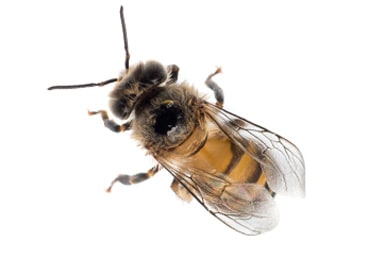
As their name suggests, solitary bees live and nest on their own instead of living in large colonies like other species of bees. These bees survive on their own without the help of other individuals; they generally create their nests in the ground.
| Pest Identification | |
|---|---|
| Recognition | There are many species of solitary bees and each has their own appearance. A common solitary bee species is the digger bee. Adults grow to be between ¼ and 1/2 an inch in length. Digger bees can be shiny metallic black, dull black, or brown and can have (or not have) white, yellow, and/or red markings. Other types of solitary bee include mining bees, leaf-cutting bees, and sweat bees. |
| Biology | Solitary bees have one generation per year. In the spring, solitary bees will emerge from underground nests, and the females and males will mate. After mating, the females will dig a hole about ¼ of an inch into the ground, will create tunnels and burrows, and will lay their eggs in the nest. The female gathers and places nectar and pollen in the nest, which the larvae will feed on once they hatch. The larvae feed, grow, and develop in the ground until the next spring when they emerge as adults and begin the lifecycle over again. |
| Habits | Solitary bees are beneficial to the environment because they will pollinate a variety of plants and crops. Even though they are solitary and create their own individual nests, they can often be seen nesting together in the same location. They like to make their nest in the soil of thin or sparse grass. The venom found in the stinger of solitary bees is strong enough to cause an allergic reaction in people; in some people, the allergic reaction is very severe and will require immediate medical attention. These species of bees are not particularly aggressive and usually only sting people if they are stepped on or are being provoked or directly handled. Also, the sting from these types of bees is usually less painful than that of other more aggressive stinging insect species. |
| Prevention | The best way to prevent problems with solitary bees on your Missouri property is to put into place a year-round pest control service. Controlling these pests on your own is challenging, but one of the best things that you can do to deter solitary bees from your property is to make sure that your lawn is green and lush because solitary bees like to create their nests in the ground of unhealthy lawns. |
| Professional | If solitary bees have become problematic on your property, Rottler Pest and Lawn Solutions can help. Solitary bees are considered to be a beneficial pest, but if they become a nuisance or danger to you and your family, our experienced technicians can help to safely control and get rid of these pests from your property. |

